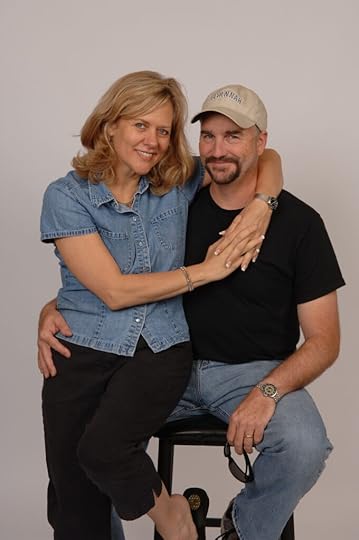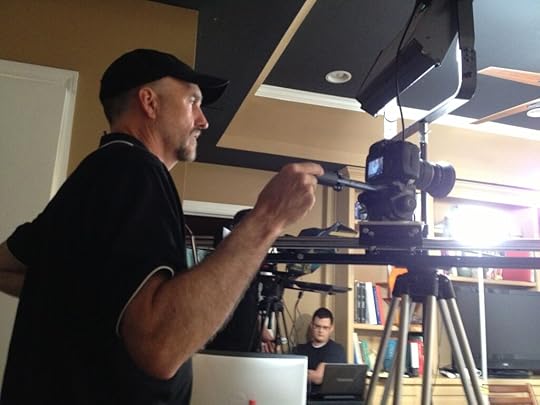Shaunti Feldhahn's Blog, page 16
November 29, 2022
A Devotional Story Update and Tribute
A few years ago, I wrote a devotional book called Find Peace. In Day 9, which you will see below, I shared the story of close friends – “Lara and Aaron” – who were walking with love and grace through the excruciating experience of learning that Aaron had early-onset Alzheimer’s.
Since that time, Aaron has been on a long and heartbreaking goodbye. But he and Lara never lost their love. Aaron prayed for our family even when he could no longer communicate. He worked to keep up his cheerful spirit even when confusion painfully clouded his mind. And he loved his sweet wife even when he could no longer tell her so. He is a true hero.
And Lara . . . she is even more of a hero. She has loved and served through the exhaustion and emotions of watching her husband’s capacities slowly disappear.
Today, I can share that “Lara and Aaron” are actually our amazing friends Lisa and Eric Rice – who many of you know as our co-authors and co-researchers on For Young Women Only, For Young Men Only, and For Parents Only. Lisa was also one of the key writers who helped draft multiple devo days in Find Rest, Find Joy, and Find Peace. And until his illness forced him to step back, Eric and Lisa were also our main video production company. For most of our ministry, if you saw any sort of video of me and Jeff, Eric was the genius behind the scenes.
I share this update, and this excerpt from Find Peace, as a tribute to our friend, who on Friday went racing into the arms of Jesus. Jeff and I are dealing with complicated grief. The anguish of losing a deep friend. The sadness for what Lisa has had to carry and will have to carry as she forges ahead without him. The deep sorrow for their kids who lost a dad way too soon. Comforting our own kids as they grieve the loss of a much-loved godfather. And yet . . . even in the middle of these tears, we are shouting our thanks to the heavens for the life of our friend, who now has a new mind and a new body and is more ALIVE than ever before!
Eric Rice ran his race so well. He was hilarious and adventurous and wise. And he lived a life of Christ-like love through all the hardship. We miss him so much. But we are also so grateful to know that, because of Jesus, we will see our friend again. (You can see Eric’s obituary here.)


 Find Peace, Day 9
Find Peace, Day 9But the fruit of the Spirit is love, joy, peace . . .Galatians 5:22
Did You Learn How to Love?Five years ago, two of our closest friends – our kids’ godparents – received news that would shatter their world. Although barely over the age of 50, the couple, whom I will call Aaron and Lara, noticed that Aaron had been having weird memory issues. After months of testing, the neuropsychologist gravely said, “We believe it’s early-onset Alzheimer’s. And I’m afraid there is no cure.”
The doctor explained to our stunned friends how the disease progressively affects the brain, ending with, “If I were you, I would get your affairs in order. I’m so sorry.”
Knowing that God is the God of the impossible, Aaron and his wife Lara began an intense search for help and hope. They went to many meetings to pray for healing, joined a support group that researched all forms of dementia, transformed their diet, exercised daily, and added powerful supplements and prescriptions to Aaron’s routine.
Yet the disease progressed. They had to give up their family business and saw friends drift away. We no longer have high-energy, hilarious game nights listening to Aaron’s comedic interpretations. He struggles to carry on a conversation, to remember how to take dishes to the sink. Lara now carries the entire burden of providing for and encouraging the family. They continue to pray for healing. But right now, they are walking through a very, very hard valley.
Yet Lara and Aaron’s faith has turned into something that shines like gold. They have lost an entire way of life, but both have a peace that passes all understanding. A peace at which Jeff and I can only marvel. And it is not because they are trying to have peace, but because they are trying to be people of love.
As Lara told me, “We all want logical answers and peace in life. But when you look at the fruits of the spirit, love and joy are listed before peace. I’ve heard it said that in heaven, God will hug us and ask us one question: ‘Did you learn how to love?’ I so want my answer to be yes.”
Love comes before peace. That is a profound truth to consider.
Did you learn how to love? That is a profound question to grapple with.
All of us have uncertain futures. In times of difficulty, we can get so focused on the valley around us that we miss what God wants to do in our life – and our children’s lives – during that time.
When facing turmoil, people tend to choose one of two paths, don’t they? Some are filled with frustration and anger over their trials, while others find supernatural peace amidst the storms. Some grow hard and cold; others find a love that they would never have understood apart from a time of pain.
Today, as Jeff and I and our children watch Aaron, it brings tears to our eyes. But not for the reason you would think. Yes, we have cried many times over the future that has been denied our friends. We have been angry with God for allowing them such a hard path. But mostly, when the tears come, it is because we see the precious love of Jesus shining through them. A love that leads Lara to serve her husband with sweetness and an eternal perspective every day. A love that leads Aaron to pray for our family and dozens of others throughout the day. A love that leads him to tell us, “I may not be able to do much more than pray for people and listen to and encourage Lara each day, but I’m going to try to be the best pray-er and encourager I can be.”
What a key challenge for us and our children: Instead of making peace our ultimate goal, we should ask, Am I learning how to love? As we do, peace will come.
If you are dealing with your own season of grief, I’d encourage you to find a comfortable chair, settle your heart, and listen to this beautiful, celebration-of-life hymn, Come Home. It was written by my mother, Judy Reidinger, who is a long-time songwriter, and has been a blessing to many people walking through such a season.*
This article was also published at Patheos.
Check out the online courses of Shaunti’s research and teachings at SurprisingHope.com.
Do you want Shaunti to share these life-changing truths at your church or event? Send us a speaking inquiry request today!
Please note: This post may contain affiliate links. As an Amazon Associate we earn a small amount from qualifying purchases through these affiliate links. This doesn’t cost you anything, and helps us continue bringing you great content!
#mc_embed_signup{background:#fff; clear:left; font:14px Helvetica,Arial,sans-serif; } /* Add your own Mailchimp form style overrides in your site stylesheet or in this style block. We recommend moving this block and the preceding CSS link to the HEAD of your HTML file. */ .button {background-color: #3389C2;background:#3389C2;color: #fff} Receive Shaunti’s Blog & Updates* indicates required Email Address * (function($) {window.fnames = new Array(); window.ftypes = new Array();fnames[0]='EMAIL';ftypes[0]='email';fnames[1]='FNAME';ftypes[1]='text';fnames[2]='LNAME';ftypes[2]='text';fnames[3]='SOURCE';ftypes[3]='text';fnames[4]='MMERGE4';ftypes[4]='text';fnames[5]='MMERGE5';ftypes[5]='date';fnames[6]='MMERGE6';ftypes[6]='text';fnames[7]='MMERGE7';ftypes[7]='text';fnames[8]='MMERGE8';ftypes[8]='text';fnames[9]='MMERGE9';ftypes[9]='text';fnames[10]='MMERGE10';ftypes[10]='phone';}(jQuery));var $mcj = jQuery.noConflict(true);More from Shaunti’s Blog:
 A Devotional Story Update and Tribute
A Devotional Story Update and Tribute
 Two Steps to Improving Your Emotional Health This Thanksgiving
Two Steps to Improving Your Emotional Health This Thanksgiving
 National Adoption Month and How to Love Adoptive Families Well
National Adoption Month and How to Love Adoptive Families Well
 A Challenge for Churches, Friends, and Women in the Workplace
A Challenge for Churches, Friends, and Women in the Workplace
 Do you need to let go of control in your marriage?
Do you need to let go of control in your marriage?
 The Benefits Of Not Getting Married Just To Get Married
The Benefits Of Not Getting Married Just To Get MarriedThe post A Devotional Story Update and Tribute appeared first on Shaunti Feldhahn.
November 22, 2022
Two Steps to Improving Your Emotional Health This Thanksgiving
I think we can all agree that in many ways this has been a brutal year. Or three. The war in Ukraine. Continued pandemic impacts. Unprecedented levels of anxiety. Spiking costs.
But . . . there are also many ways in which this has been a time of grace. Marriages have been strengthened. Church attendance among Millennials and Gen-Xers has soared to even higher levels than before the pandemic. And despite those high levels of anxiety, the pandemic-enforced togetherness of many parents and kids actually improved mental and emotional health for many children.
Both big-picture (societal level) and little-picture (individual level), all of us have a lot to be thankful for this year!
So why doesn’t it always feel like there’s a lot to be thankful for?
It turns out, many of us want to have that sense of gratitude but are not taking the two crucial steps needed to actually create it. So this Thanksgiving, let’s take these two steps together – and improve our mental and emotional health at the same time.
Step # 1: Go looking for the goodNot long ago, I wrote about a crucial neuroscientific principle: What you focus on is what you will see. This truth has a profound impact on our mental and emotional health, our relationships, and pretty much everything else in life.
Here’s why it matters for thankfulness: In a broken world, we have to train ourselves to see and focus on the good stuff. Because it is easy to see the bad stuff. That comes at us every day. If we wanted to go through a depressing exercise, we could easily list the negative things that occur in our lives and world around us.
Yet the good stuff is there, too: We just have to be purposeful about lifting our eyes and looking for it. Every one of us have dozens – hundreds! – of things we can be thankful for, big and small: The encouragement from a friend, the roof overhead, the care of a pastor, our ability to earn income, the freedom to attend church without persecution. When we go looking for those good things, we will see them much more often and much more easily. And as we focus on the good, it actually blocks the negative, depressing emotions – envy, resentment, etc. – that could have so easily filled us if we weren’t careful.
As one leading gratitude researcher, Dr. Robert Emmons, put it: “This makes sense: You cannot feel envious and grateful at the same time.”
So going looking for the good gives us our starting point. But to create a long-lasting feeling of thankfulness, we need an essential Step #2.
Step # 2: Express your gratitude – don’t just think itIn 2015, some Indiana University researchers discovered the secret sauce to thankfulness that many of us miss: Gratitude has to be expressed in order to have the impact we are hoping for.
I was particularly interested in this, since our research for the 30-Day Kindness Challenge found that we don’t actually express gratitude and praise nearly as often as we think we do! We think it, but somehow we don’t actually say it.
The Indiana University researchers explained that most gratitude studies were done among the general population, including those doing great in their mental and emotional health. These researchers instead wanted to look at whether thankfulness had any impact on people having a challenging time. So they studied adults starting counseling for depression and anxiety, and randomly assigned them to one of three groups. The first group was asked to write a letter of gratitude to another person each week for three weeks. (This expression of gratitude didn’t even have to reach the person they were grateful for; only 23% of the participants actually sent the letters). The second group wrote about their feelings and concerns; essentially, they wrote about why they were in counseling. The third set was the control group; they didn’t do any writing.
It wasn’t even close. The first group had the best improvement in their mental health and feelings of gratitude. But here’s the interesting part: it grew over time! Most “think positively” experiments find a spike in positive feelings, which return to baseline before too long. But in the wake of actually expressing (not just thinking about) thankfulness, the positive impact on these participants strengthened in the following months. Even though the first group only wrote their “gratitude letters” for three weeks, they were still doing far better three months later! The researchers were so struck by this that they did fMRI scans on the brains of those in the “expressive” group and found they had more neural sensitivity in the medial prefrontal cortex – which is where you learn and make decisions. In other words, their brains appeared to have “woken up” to the benefits of purposefully expressing gratitude, so they felt a need to do it even more. Which, as you can imagine, creates a positive cycle.
“Be thankful in all circumstances”In a world of need, it’s not always easy to purposefully keep gratitude in mind. But it is one of the crucial actions we are supposed to take – not just to help ourselves, but to honor the One to whom all Thanks are ultimately given.
Two thousand years ago, the Apostle Paul spent time in the ancient city of Thessalonica, and many people came to Christ. Paul traveled onward – but he apparently was worried that the faith of these new believers would wither under the relentless persecution of the day. He sent the young pastor Timothy back to check on them . . . and was thrilled to learn that despite the many hardships the church was enduring, the believers had been faithful! They had even grown in their faith and hope.
This Thanksgiving, we want to grow in our faith and hope too – no matter what is going on around us. So I’ll leave you with the words of challenge that Paul wrote to that ancient church, celebrating their faithfulness, and urging them to keep their eyes on the ultimate hope of eternity: “Rejoice at all times. Pray without ceasing. Give thanks in every circumstance, for this is God’s will for you in Christ Jesus.”*
*1 Thessalonians 5:16-18
This article was also published at Patheos.
Check out the online courses of Shaunti’s research and teachings at SurprisingHope.com.
Do you want Shaunti to share these life-changing truths at your church or event? Send us a speaking inquiry request today!
Please note: This post may contain affiliate links. As an Amazon Associate we earn a small amount from qualifying purchases through these affiliate links. This doesn’t cost you anything, and helps us continue bringing you great content!
#mc_embed_signup{background:#fff; clear:left; font:14px Helvetica,Arial,sans-serif; } /* Add your own Mailchimp form style overrides in your site stylesheet or in this style block. We recommend moving this block and the preceding CSS link to the HEAD of your HTML file. */ .button {background-color: #3389C2;background:#3389C2;color: #fff} Receive Shaunti’s Blog & Updates* indicates required Email Address * (function($) {window.fnames = new Array(); window.ftypes = new Array();fnames[0]='EMAIL';ftypes[0]='email';fnames[1]='FNAME';ftypes[1]='text';fnames[2]='LNAME';ftypes[2]='text';fnames[3]='SOURCE';ftypes[3]='text';fnames[4]='MMERGE4';ftypes[4]='text';fnames[5]='MMERGE5';ftypes[5]='date';fnames[6]='MMERGE6';ftypes[6]='text';fnames[7]='MMERGE7';ftypes[7]='text';fnames[8]='MMERGE8';ftypes[8]='text';fnames[9]='MMERGE9';ftypes[9]='text';fnames[10]='MMERGE10';ftypes[10]='phone';}(jQuery));var $mcj = jQuery.noConflict(true);More from Shaunti’s Blog:
 Two Steps to Improving Your Emotional Health This Thanksgiving
Two Steps to Improving Your Emotional Health This Thanksgiving
 National Adoption Month and How to Love Adoptive Families Well
National Adoption Month and How to Love Adoptive Families Well
 A Challenge for Churches, Friends, and Women in the Workplace
A Challenge for Churches, Friends, and Women in the Workplace
 Do you need to let go of control in your marriage?
Do you need to let go of control in your marriage?
 The Benefits Of Not Getting Married Just To Get Married
The Benefits Of Not Getting Married Just To Get Married
 No, I don’t have a microphone in your house
No, I don’t have a microphone in your houseThe post Two Steps to Improving Your Emotional Health This Thanksgiving appeared first on Shaunti Feldhahn.
November 17, 2022
National Adoption Month and How to Love Adoptive Families Well
A Note from Shaunti: Did you know that November is National Adoption month? Recently I was looking around the table at our regularly scheduled staff meeting and I realized that four of my eight core staff members are adoptive families! Wow! I’ve had the privilege of walking alongside several of them over the years and I know it is both a beautiful and difficult journey.
Many of us who are not adoptive families have wondered: is there a way to support the adoption and foster care community even if we don’t feel called to become an adoptive family ourselves? Quick answer: YES! This week, I asked my new blog coordinator, Kristy Floyd, to share a bit of her story and how we can best support the adoptive families we know.
Guest Post by Kristy Floyd
Have you ever been in a position where someone genuinely wanted to love you well so they kept asking what you needed, but you could never figure out what to say because you yourself had no idea? Much of our adoption journey has been like that: paved with individuals, friends, family members, and church family asking, “what do you need?” And unfortunately, our response was always, “we honestly just don’t know.”
I’d like to take a moment here to help people who have wondered, and been asked, that question.
My husband, Dane, and I, were in our mid-20s when our family expanded, literally overnight, from one to three children – all around the age of six. “Irish triplets,” people would say. We thought we were ready for this. After all, we had done all the research and read so many books on being an adoptive family. As my dad noted four years later, we felt like we knew it all, but truly didn’t have any idea of what we were walking into as a young husband, wife, and sister. He was so right. We weren’t prepared for the hurt our children had endured and the pain it would cause all of us as we walked with them through healing.
We felt powerless in those moments when people could see our suffering and feel our weariness and we still had no idea how to answer their pleas. What do we need? We need a miracle. For the pain to go away. For the love to grow faster and our kids’ hearts to attach well – even though it wasn’t my skin next to theirs when they were born.
It was and still is so much to carry. But there’s that great phrase in the Bible: “But God….” He always makes a way, doesn’t He? Christian community was and still is a huge part of the answer. Having others surround us with their experience, help, or simply with their willingness to be present was a game-changer for our whole family.
So what is it that those in Christian community can do to help, when a family may not even know themselves? Realistically, every family that walks through adoption will need something different in the ever-changing seasons of their lives for years to come. But there are things that can be done, even when the answer still is, “I wish I knew”:
Pray, pray, pray.First and foremost, pray. In fact, you may want to make prayer your main ministry to an adoptive family you know.
God is doing a powerful work in adoptive families as they work to help kids heal from trauma (which many adopted kids have, even if they were adopted as infants). And prayer is a key way of fighting the battle – a battle that is not for the faint of heart. It takes many warriors to stand in the gap for families that are often exhausted and feeling alone.
Pick an adoptive family that you know – or more than one – and ask them what you can pray for. Then pray faithfully and follow up to see how they’re doing and get their latest prayer requests. That process will allow the family to trust you with the real prayer requests over time. You might hear big issues, and you might hear small ones. (As one adoptive mom on my team said, after reading a draft of this blog, “I had people storming the gates of heaven over potty training!”)
Be there.Be present. There is such peace in knowing that the journey is not walked alone. Sitting with an adoptive mom and/or dad to let them vent about setbacks or celebrate their older child finally giving them a hug is a powerful gift.
One caution: As you listen, some things will come up that sound so foreign to you – at least if you don’t have foster or adopted kids yourselves. Be careful to listen with love, not judgment. And to be a source of strength, not need. One adoptive mom put it this way, “One woman became such an important source of support for me because she would listen as I shared these really hard things, and she was sympathetic and comforting, but she didn’t get emotional or teary-eyed. She stayed calm. That was so valuable because I was wrestling so much with my own emotions, it was too much for me to manage other people’s emotions. So I ended up not sharing a ton with other people because I didn’t have the bandwidth to help them when I could barely help myself.”
Another idea: as you engage with the family, keep an eye out for ways to come alongside that might simply be encouraging. For example, I was given Shaunti’s book, Find Rest. It was something I didn’t know I needed but something God definitely provided. Each devotional helped me walk through times when my heart needed a break or gave permission to trust in my Savior and Abba Daddy when our life felt like it was falling apart.
The people who came alongside us helped me to rest in God’s promise from Isaiah 61:3: that He was taking the ashes of trauma and making them beautiful through the restoration of our family.
Offer to help with specific needs.This is a big deal: Ask adoptive families how you can help meet specific needs that you know exist. Instead of “how can I help?” ask, “What dinner can I bring by this week?” Instead of “is there anything I can do?” ask, “Which appointment do you need babysitting for, so I can occupy your other kids while you take Robbie to the therapist?” Or even, “When can we have your kids be with us for the weekend, so you and your spouse can get away for two days?”
There will be other specifics, but trust me: every adoptive parent needs food, babysitting, and respite time.
Seek ways to learn.Finally, work to understand. Ask adoptive families for recommendations of books, websites, and training programs that will allow you to better see life through their eyes. As you understand their family, and what parenting looks like for them, you will start to see more and more how you can be an important ministry to and partner in what God is doing in their family.
These days our kids are preteens and we are healing every day. And thankfully, people continue to ask the question of how they can help. At least in this season, we are finding ways to answer them. None of them require money or expertise. Presence is the most powerful gift.
Spend time in prayer today. Ask God to give voice to adoptive families to find community and for wisdom as to how you can help meet their needs along the way.
Kristy Floyd is the blog coordinator for Shaunti.com, as well as a wife and an adoptive mom. She lives in Texas with her husband, Dane, kids Brenley and Mathan, as well as their spunky Boston Terrier, Fawkes. (Unexpected events occur, as many adoptive families understand, so they are now a family of four, instead of five, but that is a story for a different time.) As a family, they enjoy traveling, food, Jesus, and board games. Daily, they are overwhelmed by God’s promises and the truth that He is bringing beauty from ashes.
This article was also published at Patheos.
Check out the online courses of Shaunti’s research and teachings at SurprisingHope.com.
Do you want Shaunti to share these life-changing truths at your church or event? Send us a speaking inquiry request today!
Please note: This post may contain affiliate links. As an Amazon Associate we earn a small amount from qualifying purchases through these affiliate links. This doesn’t cost you anything, and helps us continue bringing you great content!
#mc_embed_signup{background:#fff; clear:left; font:14px Helvetica,Arial,sans-serif; } /* Add your own Mailchimp form style overrides in your site stylesheet or in this style block. We recommend moving this block and the preceding CSS link to the HEAD of your HTML file. */ .button {background-color: #3389C2;background:#3389C2;color: #fff} Receive Shaunti’s Blog & Updates* indicates required Email Address * (function($) {window.fnames = new Array(); window.ftypes = new Array();fnames[0]='EMAIL';ftypes[0]='email';fnames[1]='FNAME';ftypes[1]='text';fnames[2]='LNAME';ftypes[2]='text';fnames[3]='SOURCE';ftypes[3]='text';fnames[4]='MMERGE4';ftypes[4]='text';fnames[5]='MMERGE5';ftypes[5]='date';fnames[6]='MMERGE6';ftypes[6]='text';fnames[7]='MMERGE7';ftypes[7]='text';fnames[8]='MMERGE8';ftypes[8]='text';fnames[9]='MMERGE9';ftypes[9]='text';fnames[10]='MMERGE10';ftypes[10]='phone';}(jQuery));var $mcj = jQuery.noConflict(true);More from Shaunti’s Blog:
 National Adoption Month and How to Love Adoptive Families Well
National Adoption Month and How to Love Adoptive Families Well
 A Challenge for Churches, Friends, and Women in the Workplace
A Challenge for Churches, Friends, and Women in the Workplace
 Do you need to let go of control in your marriage?
Do you need to let go of control in your marriage?
 The Benefits Of Not Getting Married Just To Get Married
The Benefits Of Not Getting Married Just To Get Married
 No, I don’t have a microphone in your house
No, I don’t have a microphone in your house
 Finding Hope in a Breast Cancer Journey – PART 2
Finding Hope in a Breast Cancer Journey – PART 2The post National Adoption Month and How to Love Adoptive Families Well appeared first on Shaunti Feldhahn.
November 10, 2022
A Challenge for Churches, Friends, and Women in the Workplace
This is an On the Road blog. Occasionally I will use this space to highlight a helpful idea or observation from events where I have spoken, or share research conducted on the road. If you know of someone who might benefit, forward this along!
A few weeks ago, speaking at a series of women’s events, I was reminded of something I have seen time and again – but something that we in the church can easily miss: Women who work full-time and/or demanding jobs are starved for fellowship with other Christian women. Especially for fellowship with those who “get” their lives.
Friends, this is not a small group of people. Somewhere between 40-50% of women today work full-time, year-round jobs.* And most do so out of economic necessity. We in the church – we who are friends or church leaders of women in this category – should take a moment and think about the need. And what we can do to meet it. In addition, those of us who are in this category ourselves must be willing to seek out support.
The first time I really grasped how important this was, I was speaking for a very large church that had decided to put on their first event for women in the workplace. They set up a night of teaching, fun, and fellowship – but they also set up something else. Each woman who registered was asked just a few questions about themselves and their work life. For example, were they an employee or a business owner? An executive or an entry level professional? Were they at a large corporation or a small nonprofit?
The event organizers used that information to do something unique: they set up round tables (instead of the usual rows of seating) and assigned women to a table of those in similar situations. The eager entry level professionals were at these two tables, the entrepreneurs were at those three tables over there, and so on.
Each of us who were speaking shared a short(ish) talk and each time the tables were given 10-12 minutes to discuss it, before turning back to the next speaker, and, eventually, a Q&A with a panel of the three speakers. It was a fun and hopefully helpful process.
And then the amazing thing happened.
Women Craving CommunityThe organizers said, “OK! You’re dismissed. The speakers have book tables set up in the lobby, and we have coffee and desserts. See you out there.” The organizers and the three speakers headed out to the lobby, and we waited for the women to arrive.
And waited. And waited.
Eventually, confused, we poked our heads back into the main room. Hundreds of women still sat at the round tables, talking animatedly, sharing life, trading contact information and war stories. Ten minutes later, not one woman had gotten up. They eventually started trickling out, but most stayed right where they were. It wasn’t until half an hour after the event, when the crew that had to convert the room got antsy, that we reluctantly flashed the lights and told everyone that the church needed the room back.
Working Women’s Long List of PrioritiesCan you see why I say that these women are starved for fellowship? Everyone lives busy lives these days, but a woman who is juggling both her personal life and a full-time or demanding job, has a unique sort of busyness. When she is home, especially if she has a husband and/or children, she wants to be home with them. She has spent enough time away from them already. So when the church has the annual women’s conference, she takes little Josie to the T-ball game instead. When other women are in the fall Bible Study, she is in back-to-back work meetings. And when her friends are in their Thursday night church small groups, she is at home with her husband or out with her boyfriend, trying to catch up after her four-day business trip. She would like to be at the women’s conference or the Bible Study or the small group – in fact, she’s longing for that sort of thing – but these are the choices she has to make in order to prioritize what matters most.
The problem is, she is rarely going to prioritize herself.
A Unique Opportunity for the ChurchFriends, I would argue that we in the church need to get purposeful about supporting these women, in much the same way we are purposeful about making sure we have a fall women’s Bible Study. It will look different than the usual women’s ministry initiatives – for example, if doing an event, a Sunday evening is usually better than Saturday morning, and multiple churches may need to partner together for scale. But the impact is priceless. In large part because any water is life-giving to a thirsty soul.
I’ve spoken at multiple such events, and each time I heard the exact same thing I did from the women’s ministry team who put on the event a few weeks ago: “This is a whole different group of women than I’ve seen before, at any other event!”
Yes, exactly. This is slightly in jest, but it is almost an unreached people group!
Working Women Can Be a Light in the WorkplaceAnd this is not in jest: women in the workplace who do know Jesus can be a great source of support to those who may not. These initiatives, in truth, provide opportunities to reach others who feel a deep need for friendship but who may not be regular churchgoers.
All this is not to say that a church shouldn’t also have a broader ministry to everyone in the workplace, not just women. That’s valuable, too. But in practice, those “marketplace ministries” often become a sort of men’s ministry. And don’t get me wrong: we need men’s ministries! (It will have to be a whole other blog, but there is an epidemic of men who also are starved for friendship, and who have few close friends other than their wife.) But working women rarely get the unique personal support they are longing for in a co-ed “marketplace ministry” environment.
So what do we do with this? Well, if you are a friend of a woman in a demanding job, invite her and her family over for dinner and ensure that there’s someone who can help play with the kids while you’re lingering over coffee. If you are a church, consider something that would equip and encourage this group. And if you are the woman in the demanding job, seek out some of the great online resources and in-person communities out there (a few ideas below), soyou can be refreshed and renewed to head back out on that business trip next week, knowing that you have the fellowship and support you need at home.*
A few key resources: 4Word (a large ministry providing community and content for Christian women in the workplace, including online and via local chapters around the U.S., mentoring, podcasts, and more), Thrive Today (resources to empower Christian women in the workplace to grow in faith and influence, including Thrive Today Magazine), and Christian Working Women (online encouragement, equipping and empowering for Christian women in the workplace, including online Bible studies).
*We don’t know exactly what percent of working-age women work full time, as it depends on how “working-age” and “full-time” is defined, and no one data set includes all necessary data from the same year. These back-of-the-envelope ratios are calculated from various 2016–2021 Bureau of Labor Statistics data sets for women age 20-69.
This article was also published at Patheos.
Check out the online courses of Shaunti’s research and teachings at SurprisingHope.com.
Do you want Shaunti to share these life-changing truths at your church or event? Send us a speaking inquiry request today!
Please note: This post may contain affiliate links. As an Amazon Associate we earn a small amount from qualifying purchases through these affiliate links. This doesn’t cost you anything, and helps us continue bringing you great content!
#mc_embed_signup{background:#fff; clear:left; font:14px Helvetica,Arial,sans-serif; } /* Add your own Mailchimp form style overrides in your site stylesheet or in this style block. We recommend moving this block and the preceding CSS link to the HEAD of your HTML file. */ .button {background-color: #3389C2;background:#3389C2;color: #fff} Receive Shaunti’s Blog & Updates* indicates required Email Address * (function($) {window.fnames = new Array(); window.ftypes = new Array();fnames[0]='EMAIL';ftypes[0]='email';fnames[1]='FNAME';ftypes[1]='text';fnames[2]='LNAME';ftypes[2]='text';fnames[3]='SOURCE';ftypes[3]='text';fnames[4]='MMERGE4';ftypes[4]='text';fnames[5]='MMERGE5';ftypes[5]='date';fnames[6]='MMERGE6';ftypes[6]='text';fnames[7]='MMERGE7';ftypes[7]='text';fnames[8]='MMERGE8';ftypes[8]='text';fnames[9]='MMERGE9';ftypes[9]='text';fnames[10]='MMERGE10';ftypes[10]='phone';}(jQuery));var $mcj = jQuery.noConflict(true);More from Shaunti’s Blog:
 A Challenge for Churches, Friends, and Women in the Workplace
A Challenge for Churches, Friends, and Women in the Workplace
 Do you need to let go of control in your marriage?
Do you need to let go of control in your marriage?
 The Benefits Of Not Getting Married Just To Get Married
The Benefits Of Not Getting Married Just To Get Married
 No, I don’t have a microphone in your house
No, I don’t have a microphone in your house
 Finding Hope in a Breast Cancer Journey – PART 2
Finding Hope in a Breast Cancer Journey – PART 2
 Finding Hope in a Breast Cancer Journey – PART 1
Finding Hope in a Breast Cancer Journey – PART 1The post A Challenge for Churches, Friends, and Women in the Workplace appeared first on Shaunti Feldhahn.
November 3, 2022
Do you need to let go of control in your marriage?
A big thank you to Shannon Popkin for her guest blog this week as I finish up edits on my latest devotional, Find Hope!
Guest Blog by Shannon Popkin
Back when I had two kids in diapers, a friend mentioned one day that she had seen my husband at a coffee shop.
“Really?” I asked. “When?”
“It was yesterday,” she said. “Early evening . . . maybe 5:30 pm?”
I thought it was strange, but shrugged it off. Then another friend saw him there around the same time. And that’s when I discovered my husband’s daily coffee shop habit. I was not pleased.
5:30 pm was the time, each night, that everything was coming unglued. There were babies crying, things on the stove burning, and nerves unraveling. The thought of him serenely sipping his dark roast brew in my moments of compounding stress was infuriating! How dare he?
But when I expressed my shock and hurt, he explained that it wasn’t personal. He wasn’t trying to be insensitive; he just needed a few minutes to decompress after work, so he had built these stops at the coffee shop into his routine. When he walked in the door, he wanted to be ready to serve his family. His desire was to succeed, not only at work, but also at home.
The way he saw it, he wasn’t stopping at the coffee shop out of selfishness; he was actually doing it for us.
Trying to Control HimWell, it didn’t feel like he was doing it for us. And it did feel quite personal! How was he being anything but insensitive? I was stressed out! The kids were crying! Could he not see that I needed him home at the earliest possible moment?
My husband’s coffee shop routine was only one of dozens of things I tried to get control of in our early years of marriage. I just kept telling myself, He’s doing it wrong. I thought it was up to me to make things turn out right for our little family.
So when he did something I didn’t approve of out in public, I would tease him, roll my eyes, or gather consensus from friends and family about the ridiculousness of his choice. Behind closed doors, however, I pulled out all the stops. I would nag, belittle, rant, withdraw, or erupt. I kept digging in and insisting on my way, and he kept prying free of my white knuckles and pulling away. The more controlling I got, the more miserable we all became—myself included.
Now, this might come as a surprise, but at that point, I had no idea that I had control issues. If I had seen my book, Control Girl,on a shelf, I might have bought it for several other people I knew, but not myself. I truly thought that he was the problem. If he would just cave in already and let me mold him into the man I needed him to be, I was quite sure everything would fall into a peaceful cadence.
How wrong I was.
A Respect ExperimentOne of the tools God used to start opening my eyes to the real problem was Shaunti’s book For Women Only. I remember reading the section on “Respecting his Judgment” right before one of our date nights and decided to give it a try.
That night, when he turned the wrong way to go to the mall, I let it go. When he passed up a perfectly good parking space, I said nothing. When he decided to do the shopping return before getting dinner, I refrained from challenging him. After two hours of respectful interaction, he looked across the table into my eyes, and said, “This has been the best date! I love you so much.”
His sweet response broke my heart. How long had I been depriving this good and loving man of the respect he craved from his wife? What had I been missing out on?
It wasn’t news to me that God wants wives to respect their husbands (Eph. 5:33). It was news to me that my attempts to control everything from the socks he wore to which parking space he chose were—to him—signs of my disrespect. Shaunti says, “Often, we women will naturally say ‘I love you’ but at the same time want to control things. Unfortunately, men tend to interpret this as disrespect and distrust.” This is exactly what was happening in my marriage.
But What If He Really is Doing it Wrong?Now, it’s one thing if he wants to park the car somewhere I wouldn’t. It’s another if he wants to leave me stranded with crying babes while he sips coffee at the coffee shop. What should a wife do when she doesn’t see her husband’s behavior as respectable? Does the verse, “Let the wife see that she respects her husband,” (Eph. 5:33) still apply?
Thankfully, there’s some help a couple of paragraphs back in Ephesians 5, where several ideas are clustered together: “And do not get drunk with wine… but be filled with the Spirit . . . submitting to one another out of reverence for Christ” (Eph. 5:18, 21).
Like being filled with alcohol, when I’m filled with God’s Spirit, I’m under His influence. I do and say things I ordinarily wouldn’t. Things like giving my husband respect, even when I don’t think he deserves it—out of reverence for Christ. And when my husband is under the Spirit’s influence, he does things he wouldn’t ordinarily, as well. Things like showing me love and kindness, even when I’m not being particularly loveable.
As God has opened my eyes to the ugliness of my controlling, disrespectful behavior, more than anything He has shown me that I’m the one who’s been wrong in those ways. And as I cave into God’s Spirit, rather than my desire for control, I see God changing both me and my marriage.
Different Than MeTwenty-six years in, I still don’t understand his need to decompress after work. But in my quest to become a respectful, understanding wife, it’s been helpful to consider the ways we’re different—not just in an opposites-attract sort of way, but also in a different-by-design way.
Have you ever noticed that God made Adam out of the ground, then gave him the assignment of working the ground? But in forming Eve, God reached—not for another handful of dirt, but for one of Adam’s ribs. She was made from Adam and for Adam (Gen. 2:20, 22). Even her body—which was able to receive her husband and nurture life—tells the story of her relational design. Once again, when God passes out consequences after their sin, He highlights Adam’s and Eve’s differences: He will now toil in his work, but she will suffer pain in her relationships.
Am I saying that men aren’t relational or women don’t work? Not at all. But understanding that we’ve been formed differently is helpful to me, as a wife who’s learning to understand. No wonder I take things more personally than he does. No wonder the things I crave and grieve over in our relationship makes no sense to him. And no wonder his relationship to his work—including his coffee shop decompression stops—remains a mystery to me. We’re different. By design.
The truth is, I know my husband really does love me. There’s a good chance yours loves you, as well. When we choose control in marriage, we communicate disrespect and push our husbands away. But when we respectfully make room for differences and try to understand, we allow our husbands the pleasure of being successful—not just at work, but at home with us as well.
From the platform, page, and podcast mic, Shannon Popkin invites women to drink deeply of God’s story, and live like it’s true. Shannon’s books include Comparison Girl, andControl Girl, andshe hosts the “Live Like It’s True” podcast. Shannon has been featured on FamilyLife Today, Revive Our Hearts, and Proverbs 31.
Shannon is happy to be sharing life with Ken, who makes her laugh every day. Together, they have the joy of watching their three young-adult kids become the amazing people God created them to be.
This article was also published at Patheos.
Check out the online courses of Shaunti’s research and teachings at SurprisingHope.com.
Do you want Shaunti to share these life-changing truths at your church or event? Send us a speaking inquiry request today!
Please note: This post may contain affiliate links. As an Amazon Associate we earn a small amount from qualifying purchases through these affiliate links. This doesn’t cost you anything, and helps us continue bringing you great content!
#mc_embed_signup{background:#fff; clear:left; font:14px Helvetica,Arial,sans-serif; } /* Add your own Mailchimp form style overrides in your site stylesheet or in this style block. We recommend moving this block and the preceding CSS link to the HEAD of your HTML file. */ .button {background-color: #3389C2;background:#3389C2;color: #fff} Receive Shaunti’s Blog & Updates* indicates required Email Address * (function($) {window.fnames = new Array(); window.ftypes = new Array();fnames[0]='EMAIL';ftypes[0]='email';fnames[1]='FNAME';ftypes[1]='text';fnames[2]='LNAME';ftypes[2]='text';fnames[3]='SOURCE';ftypes[3]='text';fnames[4]='MMERGE4';ftypes[4]='text';fnames[5]='MMERGE5';ftypes[5]='date';fnames[6]='MMERGE6';ftypes[6]='text';fnames[7]='MMERGE7';ftypes[7]='text';fnames[8]='MMERGE8';ftypes[8]='text';fnames[9]='MMERGE9';ftypes[9]='text';fnames[10]='MMERGE10';ftypes[10]='phone';}(jQuery));var $mcj = jQuery.noConflict(true);More from Shaunti’s Blog:
 Do you need to let go of control in your marriage?
Do you need to let go of control in your marriage?
 The Benefits Of Not Getting Married Just To Get Married
The Benefits Of Not Getting Married Just To Get Married
 No, I don’t have a microphone in your house
No, I don’t have a microphone in your house
 Finding Hope in a Breast Cancer Journey – PART 2
Finding Hope in a Breast Cancer Journey – PART 2
 Finding Hope in a Breast Cancer Journey – PART 1
Finding Hope in a Breast Cancer Journey – PART 1
 Are You Lonelier Than You Think?
Are You Lonelier Than You Think?The post Do you need to let go of control in your marriage? appeared first on Shaunti Feldhahn.
October 27, 2022
The Benefits Of Not Getting Married Just To Get Married
Jeff and I recently watched an old favorite movie: When Harry Met Sally. I was struck yet again by a dynamic that happens when Sally finds herself alone at age 30, after having broken up with her live-in boyfriend of five years. Her friends push her to start dating again and get married quickly, lest all the good guys be gone. Sally asks: But what if it doesn’t last? Her friend looks across the table, and says, intensely, “At least you could say you were married.”
Based on the many people I’ve interviewed, variations of this dynamic are being experienced by most adults who are single and a bit older. Maybe they have never been married; maybe they are single again and hoping for things to work out better the second time. But I hear many older-single adults talk about loneliness, a desire to be in a lifetime relationship with someone who will love them unconditionally. They wonder whether of all the people they are meeting on Hinge or at the singles group, they should just “pick someone” and settle down.
I would argue that there is nothing wrong with choosing to get married and making it work. After all, millions of arranged marriages have done just fine throughout human history. But I would also encourage the older single to consider another perspective as well: that some marital benefits do come with waiting.
I know that is easy for me to say as a married person. So I decided to inquire of those who indeed had spent years feeling that Mr. or Mrs. Right was running late. Since it is easy to see only the downsides of getting married later in life, here is what I heard about the benefits of doing so, from folks who went that direction.
You’ll know yourself well.This is far more important than you may realize. When you get married with a chunk of living already under your belt, you’ll know yourself well and have far more wisdom. When you know yourself, you know what you most need in a partner, and what just doesn’t matter as much. In other words, you have a greater ability to choose someone who’s a suitable complement to your values and personality, instead of the Mr. or Mrs. Wrong who seems so enticing. After all, when you’re a bit older, there’s no point in dating just to date. When you have more wisdom, you can steer toward those with the character qualities that make for a happy marriage.
You also know what you have to offer – both your strengths and your weaknesses. You’re (hopefully) wise enough to stop the posturing and posing that comes from youth and insecurity. Without that pretense, you can be more genuine with your partner. They’ll know the real you. Hopefully, your partner will be the same. And you’ll know what’s really important to both of you as you plan your future together.
“Better late than never” isn’t trueRemember what I said about discerning the character qualities needed for a good marriage partner? One of the top pieces of advice I heard from “single-again” adults is that it is far better to remain single than to jump into a marriage that you or your partner aren’t prepared to commit to for a lifetime, for better or for worse. As one person said, “We say ‘better late than never’ but ‘never’ would have been better than marrying the wrong person.” Another told me, “I don’t think that singles realize how torturous it is to be married to someone who you feel doesn’t love you. If you aren’t sure both of you are committing to truly make it work, don’t do it.”
There is no perfect marriage or perfect person – your spouse will be married to a very imperfect person, too, right? But I heard over and over again how important it was to not blow past warning signs out of a deep desire to get married.
You’ll have a greater appreciation for your spouse and your time together.When you marry young, you have a lifetime ahead of you as a couple. So it’s easy to forget that time, and life, are finite. When you get married later and don’t have quite as much time ahead of you, you savor every moment more deeply. It’s easier to keep minor annoyances and disagreements in perspective – to not get riled up so quickly; to let moments of conflict go. With an eye on the big picture, you’ll want to enjoy the time you have together.
So you’ll prioritize spending time with your mate, which itself is a key factor in creating healthy and happy marriages. As we discovered in our research for my book The Surprising Secrets of Highly Happy Marriages, it turns out that highly happy couples don’t just spend time together because they’re happy, a big part of the reason they’re so happy is that they are spending time together!
You’ll benefit from the fact that marrying later in life is a predictor of a lasting marriage.Far from being a disadvantage, marrying a bit later in life is one of the top five characteristics of marriages that last, as we shared in The Good News About Marriage. Now, of course, many “young” marriages are wonderful and last a lifetime. But those who marry at older ages are simply statistically more likely to stay married for a lifetime than those who marry young. (Researchers theorize this is because young couples don’t yet know themselves well and aren’t as prepared for the lifetime “for better or for worse-ness” of the commitment.)
If you wait a bit, you know that your marriage is far more likely to last a lifetime. It may sound funny, but that can give you confidence to approach conflicts and difficulties with the attitude that your marriage will get through this. And that sense of hope becomes a self-fulfilling prophesy.
But be prepared for this challenge . . .Marrying later in life does present a particular challenge: both of you will be more set in your ways than younger marrieds. Because you’ve been on your own for a while, each of you will have your own ways of doing things that no one has questioned or interfered with. Your routine, your schedule, your organizational style – they’ve all been up to you. So when you settle into life with your new spouse, expect some friction as you work to find ways of doing things that satisfy you both. There will be a need to mutually adapt and change, when your spouse wants to chill at home on Friday nights when you’ve always been out on the town, or when your spouse needs to take their morning shower at the exact time you’ve always taken yours. Be open, be flexible, and find win-win options so you can establish your routines and lifestyle as a couple in ways that honor you both.
Gratitude for this new season of lifeThere is great power in gratitude. And when most older singles get married, I consistently hear a sense of gratitude for this person in their life. So embrace that. Be grateful that you have waited for the person with the right character qualities, and who is just as eager to work things out for a lifetime and let that smooth over the inevitable rough edges.
So ring out the bells, rejoice with friends and family, and enter into your later-in-life marriage with hope and promise. Being newlyweds will give you a renewed spirit and a fresh attitude. Adjust your timeline for life goals as needed, embrace a blended family if that’s what you’re creating, let go of old hurts and disappointments. Turn the page to an exciting new chapter. And enjoy the blessings of married life!
This article was also published at Patheos.
Check out the online courses of Shaunti’s research and teachings at SurprisingHope.com.
Do you want Shaunti to share these life-changing truths at your church or event? Send us a speaking inquiry request today!
Please note: This post may contain affiliate links. As an Amazon Associate we earn a small amount from qualifying purchases through these affiliate links. This doesn’t cost you anything, and helps us continue bringing you great content!
#mc_embed_signup{background:#fff; clear:left; font:14px Helvetica,Arial,sans-serif; } /* Add your own Mailchimp form style overrides in your site stylesheet or in this style block. We recommend moving this block and the preceding CSS link to the HEAD of your HTML file. */ .button {background-color: #3389C2;background:#3389C2;color: #fff} Receive Shaunti’s Blog & Updates* indicates required Email Address * (function($) {window.fnames = new Array(); window.ftypes = new Array();fnames[0]='EMAIL';ftypes[0]='email';fnames[1]='FNAME';ftypes[1]='text';fnames[2]='LNAME';ftypes[2]='text';fnames[3]='SOURCE';ftypes[3]='text';fnames[4]='MMERGE4';ftypes[4]='text';fnames[5]='MMERGE5';ftypes[5]='date';fnames[6]='MMERGE6';ftypes[6]='text';fnames[7]='MMERGE7';ftypes[7]='text';fnames[8]='MMERGE8';ftypes[8]='text';fnames[9]='MMERGE9';ftypes[9]='text';fnames[10]='MMERGE10';ftypes[10]='phone';}(jQuery));var $mcj = jQuery.noConflict(true);More from Shaunti’s Blog:
 The Benefits Of Not Getting Married Just To Get Married
The Benefits Of Not Getting Married Just To Get Married
 No, I don’t have a microphone in your house
No, I don’t have a microphone in your house
 Finding Hope in a Breast Cancer Journey – PART 2
Finding Hope in a Breast Cancer Journey – PART 2
 Finding Hope in a Breast Cancer Journey – PART 1
Finding Hope in a Breast Cancer Journey – PART 1
 Are You Lonelier Than You Think?
Are You Lonelier Than You Think?
 Need Rest? Finding It May Look Different for Men and Women
Need Rest? Finding It May Look Different for Men and WomenThe post The Benefits Of Not Getting Married Just To Get Married appeared first on Shaunti Feldhahn.
October 20, 2022
No, I don’t have a microphone in your house
It always makes me laugh. Multiple times a year, someone will come up to me at an event and say, “Did you have a microphone in our kitchen yesterday?” or “Were you listening in on our conversation in the car last week?”
One woman told me, “I get your articles, and the joke in our household is: ‘Shaunti, can you please get your microphones out of our house?’”
I laughed and said, “Clearly there’s a story there! What do you mean?”
She threw up her hands. “It is uncanny. My husband and I have a certain kind of discussion or a particular type of heated argument—and then it seems as if a blog post about that exact topic will come out the next day!”
Since I promise I am not tied into your home security system, and don’t have listening devices in your car . . . what is it about this information that seems to apply so directly to our everyday interactions in our relationships? And why does that matter?
Something surprisingly important is going on:
Creating great relationships doesn’t take rocket science!When Jeff and I investigate key factors that improve relationships, we’re essentially just digging out the truths that are “hidden in plain sight” and showing that it matters and why it matters. But once you know that stuff—you can help yourself. And that fact changes everything.
For example, perhaps you are feeling caught in a hard relationship cycle of unhappiness or arguments that seems a bit hopeless. Feeling like it is going to take two years of counseling to get to the bottom of it. But often, it is simply because you’re doing the same damaging thing over and over again—without realizing that it’s damaging! Or even that you’re doing it!
At one event, after I shared some key truths about men from my research, including about their hidden worries and self-doubts, a woman came up to me at the book table. Looking a bit shell-shocked, she said, “I had been so mad at my husband when he would say ‘Fine, you handle the kids’ rather than stepping up and helping. But until just now, I also had no idea that my husband was probably questioning every day whether he measured up as a father or a husband. I can totally see how I have completely shut him down by constantly, constantly questioning why he did this with the girls, or telling him he should have done it some other way. I wasn’t just letting him be a dad who loves his daughters and will parent differently.”
Once you have some simple but crucial knowledge, often you see a clear, simple way forward. Then you make a few key changes—and everything changes.
Once your eyes are opened, you see these truths everywhere. And as they hit home, you see more and more of what needs to change.Another woman told me this:
“You clearly have a microphone in our car. Just a few weeks ago my husband and I left a work party where we’d had an argument, and on the way home we were discussing what had happened. He thought that I didn’t appreciate him and said I had embarrassed him in front of his colleagues. I hadn’t intended to do that at all, but he was really, really upset with me and I just didn’t understand it. I thought he was overreacting. Then literally two days later your blog came out about something that had happened with you and Jeff, where you were at a party and you’d accidentally embarrassed him in front of a crowd. Suddenly, I got it—I immediately understood. And I was able to apologize to my husband from a place of understanding for the hurt that I didn’t intend.”
Her husband’s hurt came because of that under-the-surface self-doubt that I mentioned earlier, and his sense that all of his colleagues now “saw” that his wife didn’t respect him. He thought, If my wife, the person who knows me best, doesn’t respect or appreciate me . . . why should they?
Suddenly, she got it. And she was mortified. She told him how much she did appreciate him—but realized, as the days went by, just how infrequently she showed it! And how often she seemed to signal the opposite, whether by teasing him in front of a group, or by contradicting him in front of the kids. She told me that from that “aha” moment on, it was as if she saw everything so much more clearly—and knew exactly how to change it.
Once you see this for yourself—you can help your spouse see it too!We all know we can only change ourselves. But if we’re being super honest, most of us have wished we could change our spouse! “I wish he realized how much that bothers me.” “If she really cared about me, she wouldn’t ____.” And so on.
Thankfully, having our eyes opened to all these truths also gives us ways to talk about them with our spouse. Once we’ve worked on ourselves, and on interacting with our spouse in the way they need, most of the time our spouse is feeling so much more cared for that they are also much more open to learning new things themselves!
When facing relationship challenges, know that you are not alone!The research findings and relationship truths that Jeff and I share—whether it’s in person at an event, or through a book or blog post—are common to all of us. They apply to our everyday interactions . . . even your most recent discussion or argument.
The bottom line is this: when facing relationship challenges, know that you are not alone. Let’s keep working together to understand, put to work, and share these truths with others, and to nurture healthy, happy relationships! And while I don’t have access into your actual conversations, conflicts, and heated discussions, I’m always willing to hear from you about what topics you’d like to hear about next! Click here to submit ideas!
This article was also published at Patheos.
Check out the online courses of Shaunti’s research and teachings at SurprisingHope.com.
Do you want Shaunti to share these life-changing truths at your church or event? Send us a speaking inquiry request today!
Please note: This post may contain affiliate links. As an Amazon Associate we earn a small amount from qualifying purchases through these affiliate links. This doesn’t cost you anything, and helps us continue bringing you great content!
#mc_embed_signup{background:#fff; clear:left; font:14px Helvetica,Arial,sans-serif; } /* Add your own Mailchimp form style overrides in your site stylesheet or in this style block. We recommend moving this block and the preceding CSS link to the HEAD of your HTML file. */ .button {background-color: #3389C2;background:#3389C2;color: #fff} Receive Shaunti’s Blog & Updates* indicates required Email Address * (function($) {window.fnames = new Array(); window.ftypes = new Array();fnames[0]='EMAIL';ftypes[0]='email';fnames[1]='FNAME';ftypes[1]='text';fnames[2]='LNAME';ftypes[2]='text';fnames[3]='SOURCE';ftypes[3]='text';fnames[4]='MMERGE4';ftypes[4]='text';fnames[5]='MMERGE5';ftypes[5]='date';fnames[6]='MMERGE6';ftypes[6]='text';fnames[7]='MMERGE7';ftypes[7]='text';fnames[8]='MMERGE8';ftypes[8]='text';fnames[9]='MMERGE9';ftypes[9]='text';fnames[10]='MMERGE10';ftypes[10]='phone';}(jQuery));var $mcj = jQuery.noConflict(true);More from Shaunti’s Blog:
 The Benefits Of Not Getting Married Just To Get Married
The Benefits Of Not Getting Married Just To Get Married
 No, I don’t have a microphone in your house
No, I don’t have a microphone in your house
 Finding Hope in a Breast Cancer Journey – PART 2
Finding Hope in a Breast Cancer Journey – PART 2
 Finding Hope in a Breast Cancer Journey – PART 1
Finding Hope in a Breast Cancer Journey – PART 1
 Are You Lonelier Than You Think?
Are You Lonelier Than You Think?
 Need Rest? Finding It May Look Different for Men and Women
Need Rest? Finding It May Look Different for Men and WomenThe post No, I don’t have a microphone in your house appeared first on Shaunti Feldhahn.
NO, I DON’T HAVE A MICROPHONE IN YOUR HOUSE
It always makes me laugh. Multiple times a year, someone will come up to me at an event and say, “Did you have a microphone in our kitchen yesterday?” or “Were you listening in on our conversation in the car last week?”
One woman told me, “I get your articles, and the joke in our household is: ‘Shaunti, can you please get your microphones out of our house?’”
I laughed and said, “Clearly there’s a story there! What do you mean?”
She threw up her hands. “It is uncanny. My husband and I have a certain kind of discussion or a particular type of heated argument—and then it seems as if a blog post about that exact topic will come out the next day!”
Since I promise I am not tied into your home security system, and don’t have listening devices in your car . . . what is it about this information that seems to apply so directly to our everyday interactions in our relationships? And why does that matter?
Something surprisingly important is going on:
Creating great relationships doesn’t take rocket science!When Jeff and I investigate key factors that improve relationships, we’re essentially just digging out the truths that are “hidden in plain sight” and showing that it matters and why it matters. But once you know that stuff—you can help yourself. And that fact changes everything.
For example, perhaps you are feeling caught in a hard relationship cycle of unhappiness or arguments that seems a bit hopeless. Feeling like it is going to take two years of counseling to get to the bottom of it. But often, it is simply because you’re doing the same damaging thing over and over again—without realizing that it’s damaging! Or even that you’re doing it!
At one event, after I shared some key truths about men from my research, including about their hidden worries and self-doubts, a woman came up to me at the book table. Looking a bit shell-shocked, she said, “I had been so mad at my husband when he would say ‘Fine, you handle the kids’ rather than stepping up and helping. But until just now, I also had no idea that my husband was probably questioning every day whether he measured up as a father or a husband. I can totally see how I have completely shut him down by constantly, constantly questioning why he did this with the girls, or telling him he should have done it some other way. I wasn’t just letting him be a dad who loves his daughters and will parent differently.”
Once you have some simple but crucial knowledge, often you see a clear, simple way forward. Then you make a few key changes—and everything changes.
Once your eyes are opened, you see these truths everywhere. And as they hit home, you see more and more of what needs to change.Another woman told me this:
“You clearly have a microphone in our car. Just a few weeks ago my husband and I left a work party where we’d had an argument, and on the way home we were discussing what had happened. He thought that I didn’t appreciate him and said I had embarrassed him in front of his colleagues. I hadn’t intended to do that at all, but he was really, really upset with me and I just didn’t understand it. I thought he was overreacting. Then literally two days later your blog came out about something that had happened with you and Jeff, where you were at a party and you’d accidentally embarrassed him in front of a crowd. Suddenly, I got it—I immediately understood. And I was able to apologize to my husband from a place of understanding for the hurt that I didn’t intend.”
Her husband’s hurt came because of that under-the-surface self-doubt that I mentioned earlier, and his sense that all of his colleagues now “saw” that his wife didn’t respect him. He thought, If my wife, the person who knows me best, doesn’t respect or appreciate me . . . why should they?
Suddenly, she got it. And she was mortified. She told him how much she did appreciate him—but realized, as the days went by, just how infrequently she showed it! And how often she seemed to signal the opposite, whether by teasing him in front of a group, or by contradicting him in front of the kids. She told me that from that “aha” moment on, it was as if she saw everything so much more clearly—and knew exactly how to change it.
Once you see this for yourself—you can help your spouse see it too!We all know we can only change ourselves. But if we’re being super honest, most of us have wished we could change our spouse! “I wish he realized how much that bothers me.” “If she really cared about me, she wouldn’t ____.” And so on.
Thankfully, having our eyes opened to all these truths also gives us ways to talk about them with our spouse. Once we’ve worked on ourselves, and on interacting with our spouse in the way they need, most of the time our spouse is feeling so much more cared for that they are also much more open to learning new things themselves!
When facing relationship challenges, know that you are not alone!The research findings and relationship truths that Jeff and I share—whether it’s in person at an event, or through a book or blog post—are common to all of us. They apply to our everyday interactions . . . even your most recent discussion or argument.
The bottom line is this: when facing relationship challenges, know that you are not alone. Let’s keep working together to understand, put to work, and share these truths with others, and to nurture healthy, happy relationships! And while I don’t have access into your actual conversations, conflicts, and heated discussions, I’m always willing to hear from you about what topics you’d like to hear about next! Click here to submit ideas!
This article was also published at Patheos.
Check out the online courses of Shaunti’s research and teachings at SurprisingHope.com.
Do you want Shaunti to share these life-changing truths at your church or event? Send us a speaking inquiry request today!
Please note: This post may contain affiliate links. As an Amazon Associate we earn a small amount from qualifying purchases through these affiliate links. This doesn’t cost you anything, and helps us continue bringing you great content!
#mc_embed_signup{background:#fff; clear:left; font:14px Helvetica,Arial,sans-serif; } /* Add your own Mailchimp form style overrides in your site stylesheet or in this style block. We recommend moving this block and the preceding CSS link to the HEAD of your HTML file. */ .button {background-color: #3389C2;background:#3389C2;color: #fff} Receive Shaunti’s Blog & Updates* indicates required Email Address * (function($) {window.fnames = new Array(); window.ftypes = new Array();fnames[0]='EMAIL';ftypes[0]='email';fnames[1]='FNAME';ftypes[1]='text';fnames[2]='LNAME';ftypes[2]='text';fnames[3]='SOURCE';ftypes[3]='text';fnames[4]='MMERGE4';ftypes[4]='text';fnames[5]='MMERGE5';ftypes[5]='date';fnames[6]='MMERGE6';ftypes[6]='text';fnames[7]='MMERGE7';ftypes[7]='text';fnames[8]='MMERGE8';ftypes[8]='text';fnames[9]='MMERGE9';ftypes[9]='text';fnames[10]='MMERGE10';ftypes[10]='phone';}(jQuery));var $mcj = jQuery.noConflict(true);More from Shaunti’s Blog:
 NO, I DON’T HAVE A MICROPHONE IN YOUR HOUSE
NO, I DON’T HAVE A MICROPHONE IN YOUR HOUSE
 Finding Hope in a Breast Cancer Journey – PART 2
Finding Hope in a Breast Cancer Journey – PART 2
 Finding Hope in a Breast Cancer Journey – PART 1
Finding Hope in a Breast Cancer Journey – PART 1
 Are You Lonelier Than You Think?
Are You Lonelier Than You Think?
 Need Rest? Finding It May Look Different for Men and Women
Need Rest? Finding It May Look Different for Men and Women
 A Surprising Way to Encourage Your Kids’ Faith
A Surprising Way to Encourage Your Kids’ FaithThe post NO, I DON’T HAVE A MICROPHONE IN YOUR HOUSE appeared first on Shaunti Feldhahn.
October 11, 2022
Finding Hope in a Breast Cancer Journey – PART 2
October is Breast Cancer Awareness Month – something I take much more seriously than I used to, after going through treatment for breast cancer since early last year. I’ve been sharing my story and if you missed PART 1, you can catch up here.
As a reminder, we left off with me getting the “best bad news” phone call telling me I had cancer. My family was scared but I wasn’t because it didn’t feel real. And then it was very real.
More disruptive than I expected – and more supported than I could have imaginedOver the next weeks and months, as I went through preparations, surgery, and radiation, then began the long road of daily hormone therapy, I came to terms with what a disruptive and life-changing this event would be (at least in the short term). My body didn’t like the treatment regimen. We had to put the ministry on hold for months and cancel events. And during all of it, Jeff, our kids, my mom, our family, and our friends were amazing sources of strength; more than I could ever imagine. A group of amazing prayer-warrior women got on the phone with each other for an hour every week to pray for me. My neighbor and friend opened her backyard firepit so we – and close friends – could sit and talk. Which was so very important for someone who was having to go through cancer in the COVID era – where every doctor’s visit, every painful biopsy (there were many others), the surgery, and every radiation visit had to be done utterly alone.
I also realized there was a much larger community of women who were ready to support one another. My friends and fellow authors, Lysa TerKeurst and Jill Savage, were unbelievable supports, having gone through the journey ahead of me.
Many women at my events began coming up to me and saying things like, “I know it’s scary. But I’ve been cancer-free for eight years. You’ll get there!” Many others come up and shared stories that were much harder than mine – like needing months of chemo, which I was so thankful to avoid.
Finding my ultimate source of hopeIt’s been almost 20 months since we got that call, and I’m now in the process that every breast cancer survivor intimately understands: I’m having regular scans and lab work and doing ongoing hormonal therapy to try to prevent the cancer from coming back. It is easy to forget about it in between the various checks. And then as they approach, questions start sneaking into my head like “what happens if it isn’t normal? What happens if the mammogram shows something this time?”
My next set of mammograms and scans are coming up in a few weeks. And I would be lying if I said that those questions aren’t in my mind at times. There is trauma associated with thinking about having to go through all that again. But then I remind myself of the truths I’m writing in my next devotional, titled Find Hope: God is bigger than all of this. He is good. His plans and purposes can be trusted. And He is in control. That is the only way to settle our minds and hearts about looming questions that have no obvious clear-cut, reassuring answer.
I also realize that even though the enemy meant this for evil, God has been using it for good. This journey has grown my faith, Jeff’s faith, and no doubt the faith of our children. This (hopefully temporary) brush with a potentially deadly disease merely emphasizes that which we know but don’t often think about: this world is not our home. The times of pain have shown that we can lean hard against God, and He will not let us drop. When things are hard and difficult, we have seen that He is there to bring comfort. And we know that no matter what transpires in any of our lives, there is an eternal hope that is far more important than anything that happens here.
In a few weeks, I’m expecting to go in for my appointments and hear that the scans are normal. (I’d appreciate your prayers for that!) But if God allows a different answer, it doesn’t change how much we can trust Him.
For those of you who are indeed walking through a different season – walking through something hard and challenging, with answers that you don’t like – fix your eyes on Jesus. My prayer for you is that you lean hard against our Heavenly Father who loves you . . . and see that He has a purpose, that He good, and that you can trust Him.
This article was also published at Patheos.
Check out the online courses of Shaunti’s research and teachings at SurprisingHope.com.
Do you want Shaunti to share these life-changing truths at your church or event? Send us a speaking inquiry request today!
Please note: This post may contain affiliate links. As an Amazon Associate we earn a small amount from qualifying purchases through these affiliate links. This doesn’t cost you anything, and helps us continue bringing you great content!
#mc_embed_signup{background:#fff; clear:left; font:14px Helvetica,Arial,sans-serif; } /* Add your own Mailchimp form style overrides in your site stylesheet or in this style block. We recommend moving this block and the preceding CSS link to the HEAD of your HTML file. */ .button {background-color: #3389C2;background:#3389C2;color: #fff} Receive Shaunti’s Blog & Updates* indicates required Email Address * (function($) {window.fnames = new Array(); window.ftypes = new Array();fnames[0]='EMAIL';ftypes[0]='email';fnames[1]='FNAME';ftypes[1]='text';fnames[2]='LNAME';ftypes[2]='text';fnames[3]='SOURCE';ftypes[3]='text';fnames[4]='MMERGE4';ftypes[4]='text';fnames[5]='MMERGE5';ftypes[5]='date';fnames[6]='MMERGE6';ftypes[6]='text';fnames[7]='MMERGE7';ftypes[7]='text';fnames[8]='MMERGE8';ftypes[8]='text';fnames[9]='MMERGE9';ftypes[9]='text';fnames[10]='MMERGE10';ftypes[10]='phone';}(jQuery));var $mcj = jQuery.noConflict(true);More from Shaunti’s Blog:
 Finding Hope in a Breast Cancer Journey – PART 2
Finding Hope in a Breast Cancer Journey – PART 2
 Finding Hope in a Breast Cancer Journey – PART 1
Finding Hope in a Breast Cancer Journey – PART 1
 Are You Lonelier Than You Think?
Are You Lonelier Than You Think?
 Need Rest? Finding It May Look Different for Men and Women
Need Rest? Finding It May Look Different for Men and Women
 A Surprising Way to Encourage Your Kids’ Faith
A Surprising Way to Encourage Your Kids’ Faith
 The Big Blind Spot That Is Messing With Your Relationships
The Big Blind Spot That Is Messing With Your RelationshipsThe post Finding Hope in a Breast Cancer Journey – PART 2 appeared first on Shaunti Feldhahn.
October 6, 2022
Finding Hope in a Breast Cancer Journey – PART 1
“I looked you up on your blog.” One of the women at the retreat where I was speaking this weekend, stopped me on the path. “I didn’t realize you had breast cancer.” She smiled, a sister sharing a bond. “Me, too. I found out in 2015; it has been six years, and I’m clear!” She told me a little of her story – a much more harrowing story than mine – and parted with, “I just wanted to encourage you, from another survivor.”
I can’t tell you how much that meant to me.
October is Breast Cancer Awareness Month – something I take much more seriously than I used to, after going through treatment for breast cancer since early last year. I’ve now spoken to so many friends, acquaintances, readers, and women at events who have been on their own journeys, and I wanted to take a moment to tip my hat to all of you this month. Thank you, ladies, for your courage, your transparency, and your welcoming arms to every one of us who finds ourselves a part of this particular club that no one ever wanted to join.
You’ve told me your stories and hearing them has done something precious: it has allowed me to feel that I’m not alone. It has given me hope. It has taught me so much. So in case it helps someone else . . . here’s PART 1 of my story.*
Four days before Christmas 2020, Jeff and I had just finished some Christmas shopping and were driving home to meet a hairdresser friend who comes over to cut our family’s hair. My cell phone rang. It was from the center at which I had recently had a mammogram and then a biopsy. I honestly hadn’t been worried about it after that. Since our family has zero history of breast cancer, I assumed what had appeared on my screening mammogram was just a cyst or something. In fact, I had been far more concerned about the fact that a biopsy meant that someone would be inserting a needle deep into my breast. Once that ordeal was over, I stopped thinking about it.
The best bad newsOn the call, the radiologist who had done my biopsy asked how the wound was healing up. I chattered for a minute and started asking a question about some stitches that weren’t behaving. She finally cleared her throat and interrupted me. “We got the pathology results back. The report shows that there are abnormal cells.”
“Abnormal cells?” For a moment, I was completely confused. “What do you mean?”
“It means you have breast cancer.”
I looked over at my poor husband who had only been hearing my side of the conversation. “I have breast cancer?”
Jeff’s eyes went wide. He looked like I probably did: shocked and disbelieving.
“Yes. You have breast cancer. But thankfully, because we caught it on a regular mammogram it appears that we are getting it early.* I know this is bad news. But truly, this is the best bad news that you could hear right now. There is so much we can do. My colleague is going to call you in a few minutes to discuss next steps.”
As I ended the call, we pulled into our driveway. My friend was already in our house talking with our teenage children. Jeff and I had no idea how we were going to go in there and act like everything was normal; I knew I had to tell them.
I stepped inside, said hi to my kids, and asked my friend if she could come into the garage for a moment. She must have seen a weird look on my face because when we stepped back into the garage, she asked if everything was ok. When I told her what I just found out, a completely understandable expletive left her mouth. We said we needed to tell the kids, so we put the haircuts on hold, sat down with our teenagers at the kitchen table and explained what we had just learned. It was hard. They were scared.
I wasn’t scared. Because it didn’t actually feel real. But that soon changed.
Stay tuned for PART 2 in next week’s blog as I continue my story in honor of Breast Cancer Awareness Month. If you want to learn more about early detection, visit the National Breast Cancer website here.
*Editor’s note: Ladies, get your mammograms!
This article was also published at Patheos.
Check out the online courses of Shaunti’s research and teachings at SurprisingHope.com.
Do you want Shaunti to share these life-changing truths at your church or event? Send us a speaking inquiry request today!
Please note: This post may contain affiliate links. As an Amazon Associate we earn a small amount from qualifying purchases through these affiliate links. This doesn’t cost you anything, and helps us continue bringing you great content!
#mc_embed_signup{background:#fff; clear:left; font:14px Helvetica,Arial,sans-serif; } /* Add your own Mailchimp form style overrides in your site stylesheet or in this style block. We recommend moving this block and the preceding CSS link to the HEAD of your HTML file. */ .button {background-color: #3389C2;background:#3389C2;color: #fff} Receive Shaunti’s Blog & Updates* indicates required Email Address * (function($) {window.fnames = new Array(); window.ftypes = new Array();fnames[0]='EMAIL';ftypes[0]='email';fnames[1]='FNAME';ftypes[1]='text';fnames[2]='LNAME';ftypes[2]='text';fnames[3]='SOURCE';ftypes[3]='text';fnames[4]='MMERGE4';ftypes[4]='text';fnames[5]='MMERGE5';ftypes[5]='date';fnames[6]='MMERGE6';ftypes[6]='text';fnames[7]='MMERGE7';ftypes[7]='text';fnames[8]='MMERGE8';ftypes[8]='text';fnames[9]='MMERGE9';ftypes[9]='text';fnames[10]='MMERGE10';ftypes[10]='phone';}(jQuery));var $mcj = jQuery.noConflict(true);More from Shaunti’s Blog:
 Finding Hope in a Breast Cancer Journey – PART 1
Finding Hope in a Breast Cancer Journey – PART 1
 Are You Lonelier Than You Think?
Are You Lonelier Than You Think?
 Need Rest? Finding It May Look Different for Men and Women
Need Rest? Finding It May Look Different for Men and Women
 A Surprising Way to Encourage Your Kids’ Faith
A Surprising Way to Encourage Your Kids’ Faith
 The Big Blind Spot That Is Messing With Your Relationships
The Big Blind Spot That Is Messing With Your Relationships
 When Knee-Jerk Reactions Cause Money Tension In Marriage
When Knee-Jerk Reactions Cause Money Tension In MarriageThe post Finding Hope in a Breast Cancer Journey – PART 1 appeared first on Shaunti Feldhahn.



